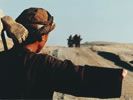Eye For Film >> Movies >> Kandahar (2001) Film Review
The war against terrorism in Afghanistan has helped to market Mohsen Makhmalbaf's film, but contributes nothing to a greater understanding of the conflict. It was made before September 11th. So much has been written about the Taliban regime that what you see here may not come as a shock. It should do.
Made like a documentary, it is convincing in every respect, but one. In a country that is starving after three years of drought and decades of internecine fighting, the women's burkahs are made of the finest material, spotlessly clean and intricately embroidered. One of the most stunning sequences in a beautifully visual film is the caravan of wedding guests trekking across sand dunes, with the bride riding a white ass and everyone else following on foot like multi-coloured ghosts.

The burkah has become the symbol in the West of the Taliban's cruel treatment of women, when, in fact, it has been a part of Muslim tradition since the beginning. Certainly, it is not a seductive garment and the vision from inside pretty limited and you can only guess at the heat, but the colours and delicacy of its cloth is exquisite.
The story, which feels so real that to describe it as fiction seems misplaced, concerns Nafas (Niloufar Pazira), a Canadian journalist, who has come to Iran to try and find a passage to Kandahar, because she has received news of her sister, who threatens to commit suicide during the solar eclipse in 10 days time. It is the journey, not the arrival, that matters, although for Nafas speed is the essence which, of course, is not an option in a country that relies more on four-legs than rubber wheels.
Nafas has been away long enough to be surprised by the changes. She cannot get used to the burkah and uncovers her face whenever possible. Everyone is on the make, especially the children. She pays over the odds for assistance and is often abandoned, or robbed. Seeing a doctor in a tiny village in the middle of nowhere is a strange experience. He cannot speak to his female patients direct, but through a third party, in Nafas's case a street boy who is acting as her guide. He can only examine through a hole in a curtain. It is almost as bizarre as watching false legs drift to earth under parachutes for the benefit of nimble land mine victims out in the dusty foothills.
Nafas is documenting her journey on a tape recorder, which enables her to comment on what she sees. As a Westernised Afghan, she finds it hard to accept the weakened position of women and aggressive nature of men, while being dependent upon them for transport and protection. The glimpse of life before the Americans changed everything, with their Christian rectitude and intimations of Armageddon, is fascinating. It is not so much stone age, as rural anarchy. The law of the gun is respected above the law of the land. Bandits set up check points on the roads, at which they take everything of value off hapless travellers, leaving them alive but destitute.
This is a film that sidesteps convention. There is no ending, no beginning. There is the journey. Plans fall down to be replaced by other plans. Certainty is a luxury that Afghans cannot imagine. Makhmalbaf, an Iranian writer/director, recognises and appreciates this. Also, he discovers surreal elements amongst the layers of suffering and deprivation.
Reviewed on: 13 Dec 2001




















